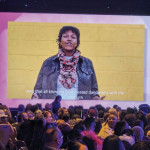What would you do if you knew you couldn’t fail? For many of us, the fear of failure can be paralyzing, impeding our efforts to take risks. Imagine living fearlessly. How would you live your life differently?
In 2011 I asked “Are You Ready?” It became my call to action. Between the Patient Protection and Affordable Care Act (ACA), National HIV/AIDS Strategy (NHAS), High Impact Prevention (HIP), and the future of the Ryan White Care Act, I was concerned that our movement was not ready for the many changes that were coming quickly and would have a major impact on community based organizations (CBO) that serve people living with HIV or AIDS (PWA).
Then in July of last year, the data behind HIV Prevention Trials Network study 052, Treatment as Prevention (TasP) was released in Rome. It gave us a pathway to significantly reduce the number of new HIV infections and maybe a way to end the AIDS epidemic. However, there is no silver bullet. TasP must be a major component of our efforts to achieve health equity among PWA and prevent onward transmission, so will other interventions like microbicides and pre-exposure prophylaxis (PrEP). We must also continue to prioritize finding a cure and a vaccine.
So Are You Ready?
Last year I talked about the following changes:
- Affordable Care Act (ACA)
- National HIV/AIDS Strategy (NHAS)
- 12 Cities Project/Enhanced Comprehensive HIV Prevention Planning (ECHPP)
- High Impact Prevention (HIP)
- Update of Funding Formula for Housing Opportunities for People With AIDS (HOPWA)
- Ryan White Extension or Reauthorization
- HHS Action Plan for the Prevention and Treatment of Viral Hepatitis
- HHS Action Plan to Reduce Racial and Ethnic Health Disparities
Has your agency updated its strategy? If not, NMAC would like to know how we can help. Email us at communications@nmac.org or leave a comment following this post or via Facebook & Twitter.
Our movement is changing and you need to keep up with those changes. Only CBOs that adapt to change will survive.
What are you doing to end the AIDS epidemic?
This is my question for 2012. What is your agency doing to end the AIDS epidemic? Do you have a strategy? Last month I shared NMAC’s (http://nmac.org/component/content/article/63-blog/1294-ending-the-epidemic-nmacs-vision-to-end-it.html) strategy/vision to end AIDS in America. Now I want to update you on our progress.
Regional Dialogues
NMAC believes that solutions need to come directly from frontline responders. To facilitate this, we are holding a series of regional dialogues across the country. So far we’ve scheduled meetings in New Orleans, LA; Los Angeles, CA; and Washington, DC.
As we put together these meetings, we also realized that it would be important to hear from HIV surveillance staff and HIV epidemiologists. Thanks to the support of the National Alliance of State and Territorial AIDS Directors (http://www.nastad.org) and Urban Coalition of HIV/AIDS Prevention Services (http://www.uchaps.org), we will hold two additional meetings with state, county and city AIDS directors, HIV surveillance staff and epidemiologists to further discuss TasP.
These regional dialogues are not about coming to consensus or even prioritizing issues. These are about NMAC listening to the needs and concerns from our community about our future. We will bring together leaders from the many communities impacted by HIV/AIDS to ask the question, “Can we end the HIV/AIDS epidemic in your city, county, or state and what is needed for that to happen?” We want to document all the issues, concerns and challenges for a briefing paper to be discussed at this year’s United States Conference on AIDS’ Summit To End AIDS In America (http://www.2012USCA.org)
Based on the evaluation of these first 5 meetings, we hope to hold additional meetings throughout the summer and into fall. However, we will not be able to hold meetings in every community. So NMAC will also put together a guide on how you can hold your own meetings and share our needs and concerns with us. We will base the guide on our experiences with the first 5 meetings.
Being Fearless
Who knows what will happen? I only know that given the data from 052, the challenges facing our movement, and the upcoming election, now more then ever we need to be fearless. I started by asking the question “What would you do if you knew you couldn’t fail?” Failure is something we all face, but our movement cannot afford to fail. This is our time to the AIDS epidemic! The only question is what will you do to end the AIDS epidemic in your community? Our movement needs leaders who are fearless, who are willing to take risks, and who want to change the world. Are you the leader your community needs?







2 Comments
2 Comments